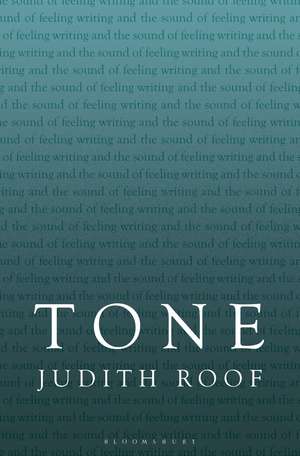Tone: Writing and the Sound of Feeling
Autor Professor Judith Roofen Limba Engleză Paperback – 28 oct 2020
| Toate formatele și edițiile | Preț | Express |
|---|---|---|
| Paperback (1) | 153.21 lei 3-5 săpt. | |
| Bloomsbury Publishing – 28 oct 2020 | 153.21 lei 3-5 săpt. | |
| Hardback (1) | 497.56 lei 6-8 săpt. | |
| Bloomsbury Publishing – 28 oct 2020 | 497.56 lei 6-8 săpt. |
Preț: 153.21 lei
Preț vechi: 166.30 lei
-8% Nou
Puncte Express: 230
Preț estimativ în valută:
29.32€ • 31.84$ • 24.63£
29.32€ • 31.84$ • 24.63£
Carte disponibilă
Livrare economică 02-16 aprilie
Preluare comenzi: 021 569.72.76
Specificații
ISBN-13: 9781501362576
ISBN-10: 1501362577
Pagini: 288
Dimensiuni: 140 x 216 mm
Greutate: 0 kg
Editura: Bloomsbury Publishing
Colecția Bloomsbury Academic
Locul publicării:New York, United States
ISBN-10: 1501362577
Pagini: 288
Dimensiuni: 140 x 216 mm
Greutate: 0 kg
Editura: Bloomsbury Publishing
Colecția Bloomsbury Academic
Locul publicării:New York, United States
Caracteristici
Provides new definitions of tone and ranges across literature, creative nonfiction, online/social media writing, and automated/computer-generated writing
Notă biografică
Judith Roof is the William Shakespeare Chair in English at Rice University, USA. She is the author of The Comic Event: Comedic Performance from the 1950s to the Present (Bloomsbury, 2018), What Gender Is, What Gender Does (2016), as well as five other monographs, six edited (or co-edited) books, and more than 80 essays on topics ranging from modern drama to The Big Lebowski, Ethel Merman, Posthumanism, the novels of Percival Everett, the work of Rabelais, Beckett, Pinter, Duras, psychoanalysis, narrative theory, film studies, genetics, critical legal studies, and secondary characters.
Cuprins
Preface-Key ToneAcknowledgments1. Setting the Tone2. Toning Up3. Tone Jam4. Intoning5. Taking That Tone6. Two Tone7. Two Tones8. Atonement: The Sound a Tree Makes When It Falls9. Tone Down10. Touch Tone11. Tense Tone12. Tone "R" Us13. We-Tone14. The Tone "We" Tell15. Tonal Dialogics16. Inscribing Tone17. Moebius Tone18. Telling Tones19. iTone20. Toning Fork21. Dissonant Tones22. Toning Up/Toning Down23. Tone-ads24. RoboToneNotesBibliographyIndex
Recenzii
Through close readings of a great variety of recent literary texts approached from the innovative angle of 'tone,' this book sheds new light on the inseparable processes of reading and narrating. Its brilliant analyses of tone, while further exploring the interactions of rhetoric and politics, allow to thoroughly revisit literary genres and categories as well as the definitions of some of the basic terms of criticism.
In scrutinizing and dramatizing the inner workings of tone via the insights of narrative theory, Judith Roof's splendid book takes us where few have traveled before. Tone demonstrates--with vim, vigor, playfulness, and humor--how one might become a better reader, audiator, and imaginary listener of complex texts, whether comic, tragic, gloomy, sanctimonious, confessional, propagandistic, ironic, parodic, or satirical.
Judith Roof's utterly original monograph promise to turn 'tone' and 'audiation,' the procedures of close reading through which tone can be discerningly 'heard,' into indispensable terms of literary analysis-and powerful obstacles to the protocols of surface reading.
In scrutinizing and dramatizing the inner workings of tone via the insights of narrative theory, Judith Roof's splendid book takes us where few have traveled before. Tone demonstrates--with vim, vigor, playfulness, and humor--how one might become a better reader, audiator, and imaginary listener of complex texts, whether comic, tragic, gloomy, sanctimonious, confessional, propagandistic, ironic, parodic, or satirical.
Judith Roof's utterly original monograph promise to turn 'tone' and 'audiation,' the procedures of close reading through which tone can be discerningly 'heard,' into indispensable terms of literary analysis-and powerful obstacles to the protocols of surface reading.
